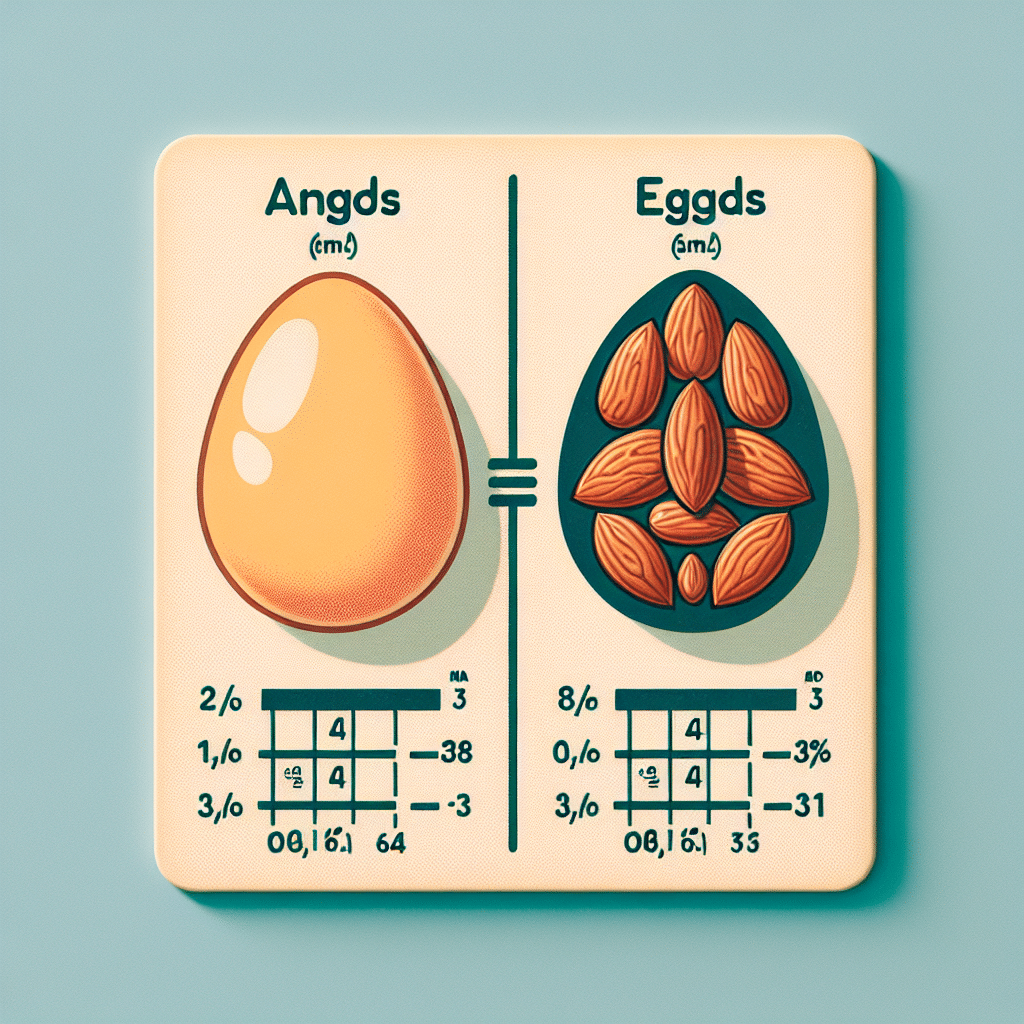How Many Almonds Equal 1 Egg?
-
Table of Contents
- Almonds vs. Eggs: Understanding the Nutritional Exchange
- Understanding the Role of Eggs in Recipes
- Almonds as an Egg Substitute
- Almond Flour
- Almond Butter
- Almond Milk
- Nutritional Comparison: Almonds vs. Eggs
- Protein Content
- Fat Content
- Vitamins and Minerals
- Practical Examples in Baking and Cooking
- Case Studies and Statistics
- Conclusion: Balancing Nutrition and Functionality
- Discover ETprotein’s High-Quality Protein Products
Almonds vs. Eggs: Understanding the Nutritional Exchange

When it comes to cooking and baking, eggs are a staple ingredient in many recipes. However, with the rise of dietary restrictions and preferences, such as veganism and egg allergies, there’s been an increasing need for alternative ingredients. Almonds, in various forms, have emerged as a popular substitute for eggs, especially in baking. But how many almonds does it take to replace one egg? This article delves into the nutritional comparison, usage, and considerations when substituting almonds for eggs.
Understanding the Role of Eggs in Recipes
Eggs play multiple roles in cooking and baking, from acting as a binding agent to providing moisture and leavening. They also contribute to the structure and texture of the final product. When considering a substitute, it’s essential to understand which function of the egg you’re trying to replicate.
Almonds as an Egg Substitute
Almonds can be used to replace eggs in several forms, including almond flour, almond butter, and almond milk. However, the conversion isn’t as straightforward as a one-to-one ratio. The substitution depends on the form of almonds used and the role of the egg in the recipe.
Almond Flour
Almond flour, made from finely ground almonds, is often used in baking. It can provide structure and moisture, similar to eggs, but it doesn’t have the same binding properties. When using almond flour as a substitute, additional binding agents like flaxseed or chia seeds may be necessary.
Almond Butter
Almond butter can act as a good binding agent due to its sticky consistency. It’s particularly useful in recipes like cookies and bars. Typically, three tablespoons of almond butter can replace one egg.
Almond Milk
Almond milk is primarily used to add moisture to recipes and can be used in combination with other substitutes to replace eggs. However, it doesn’t provide structure or binding on its own.
Nutritional Comparison: Almonds vs. Eggs
When replacing eggs with almonds, it’s important to consider the nutritional differences. Eggs are a complete protein source and contain vitamins and minerals such as vitamin B12, vitamin D, selenium, and choline. Almonds are rich in vitamin E, magnesium, and healthy fats but are not a complete protein source.
Protein Content
One large egg contains about 6 grams of protein. To match this protein content, you would need approximately 28 almonds (which is roughly one ounce or a small handful). However, the protein in almonds is not as bioavailable as the protein in eggs.
Fat Content
Eggs contain saturated fat and cholesterol, while almonds provide a significant amount of monounsaturated fats, which are considered heart-healthy. The fat content in 28 almonds is higher than in one egg, which may need to be considered for those monitoring their fat intake.
Vitamins and Minerals
While eggs contain a broader range of vitamins and minerals, almonds are particularly high in vitamin E, an antioxidant that eggs have in smaller amounts. Almonds also offer dietary fiber, which eggs lack.
Practical Examples in Baking and Cooking
When it comes to practical application, the substitution will vary based on the recipe. For instance, in baking a cake, almond flour combined with a binding agent can replace eggs to add moisture and density. In contrast, for making a quiche, there’s no direct almond substitute that can replicate the texture and binding properties of eggs.
Case Studies and Statistics
Many vegan bakeries have successfully used almond products to replace eggs. Statistics show that the plant-based food market is growing, with egg substitutes playing a significant role. According to a report by MarketsandMarkets, the global egg replacement ingredient market size is projected to reach USD 1.53 billion by 2022, growing at a CAGR of 6.2% from 2017.
Conclusion: Balancing Nutrition and Functionality
In conclusion, while almonds can substitute for eggs in some recipes, there isn’t a universal conversion rate. The form of almond used and the role of the egg in the recipe will dictate the amount needed. Nutritionally, almonds offer different benefits compared to eggs, and these differences should be considered when making substitutions. For those looking to replace eggs with almonds, it’s a matter of trial and error to find the right balance for each specific recipe.
Discover ETprotein’s High-Quality Protein Products
If you’re looking for alternative protein sources, ETprotein offers a range of organic bulk vegan proteins that can complement or replace traditional ingredients like eggs. Their products are non-GMO, allergen-free, and come with a neutral taste, making them an excellent choice for various dietary needs.
About ETprotein:
ETprotein, a reputable protein and L-(+)-Ergothioneine (EGT) Chinese factory manufacturer and supplier, is renowned for producing, stocking, exporting, and delivering the highest quality organic bulk vegan proteins and L-(+)-Ergothioneine. They include Organic rice protein, clear rice protein, pea protein, clear pea protein, watermelon seed protein, pumpkin seed protein, sunflower seed protein, mung bean protein, peanut protein, and L-(+)-Ergothioneine EGT Pharmaceutical grade, L-(+)-Ergothioneine EGT food grade, L-(+)-Ergothioneine EGT cosmetic grade, L-(+)-Ergothioneine EGT reference grade and L-(+)-Ergothioneine EGT standard. Their offerings, characterized by a neutral taste, non-GMO, allergen-free attributes, with L-(+)-Ergothioneine purity over 98%, 99%, cater to a diverse range of industries. They serve nutraceutical, pharmaceutical, cosmeceutical, veterinary, as well as food and beverage finished product distributors, traders, and manufacturers across Europe, USA, Canada, Australia, Thailand, Japan, Korea, Brazil, and Chile, among others.
ETprotein specialization includes exporting and delivering tailor-made protein powder and finished nutritional supplements. Their extensive product range covers sectors like Food and Beverage, Sports Nutrition, Weight Management, Dietary Supplements, Health and Wellness Products, and Infant Formula, ensuring comprehensive solutions to meet all your protein needs.
As a trusted company by leading global food and beverage brands and Fortune 500 companies, ETprotein reinforces China’s reputation in the global arena. For more information or to sample their products, please contact them and email sales(at)ETprotein.com today.














